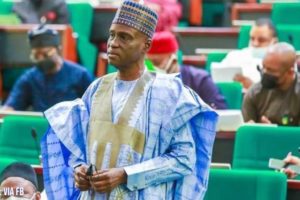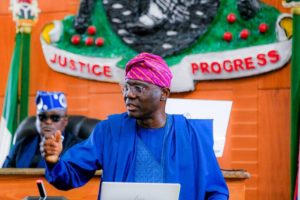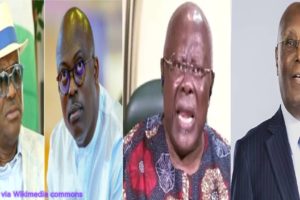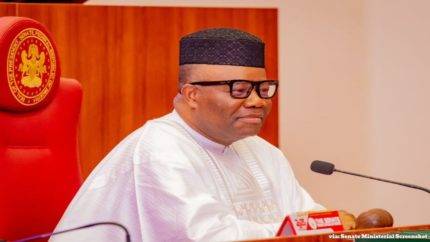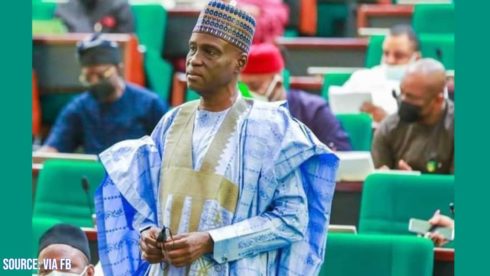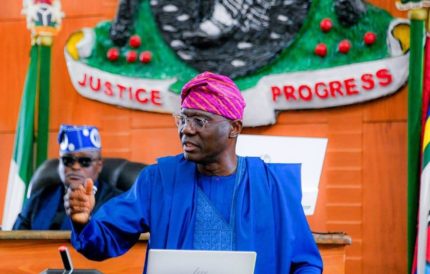Senate President Godswill Akpabio has stirred reactions across Nigeria with his recent advice urging citizens to “eat whenever they see free food.” The senator, who made this comment in response to the rising economic hardship, emphasized the importance of taking advantage of any available opportunities, including access to free meals. His remarks, delivered during a public function, have since sparked discussions on social media, with many interpreting them as a reflection of the deepening financial struggles in the country.
Nigeria has been grappling with a tough economic climate, worsened by inflation, fuel subsidy removal, and a weakened naira. Godswill Akpabio’s comment comes at a time when many Nigerians are struggling to afford basic necessities. While some see his advice as practical in light of current circumstances, others argue it trivializes the serious financial challenges that the majority of the population face daily.
A Nation Facing Economic Challenges
Nigeria’s economic landscape has become increasingly dire in recent years, with inflation rates soaring and unemployment levels rising. The removal of fuel subsidies in 2023 has also added pressure on the cost of living, leading to a surge in transportation, food, and commodity prices. These factors have compounded the daily struggles of millions of Nigerians, particularly low-income earners and small business owners.
In response to these difficulties, various state governments and private organizations have initiated free food programs to provide relief to the most vulnerable communities. However, these measures have proven insufficient in addressing the widespread economic hardship. Senator Godswill Akpabio’s comments, while perhaps intended humorously, reflect the stark reality many Nigerians face when basic sustenance becomes a luxury.
Godswill Akpabio: Mixed Reactions from the Public
Senator Godswill Akpabio’s statement has elicited mixed reactions from the public, with some expressing outrage and others defending the senator’s pragmatic approach. Critics argue that the advice, though well-meaning, downplays the gravity of Nigeria’s economic crisis. Many Nigerians took to social media to voice their concerns, highlighting the need for comprehensive policies that address the root causes of poverty, rather than just short-term solutions like free meals.
On the other hand, some citizens have interpreted the senator’s remarks as a realistic acknowledgment of the struggle faced by everyday Nigerians. In a country where hunger is becoming more prevalent, Godswill Akpabio’s advice to seize any available food has resonated with some as a reflection of the survival instincts required in these tough times. Nonetheless, the statement continues to fuel heated debates about the government’s response to economic hardship.
Government’s Efforts to Alleviate Poverty
The Nigerian government has introduced several initiatives aimed at alleviating the economic pressure on its citizens. Programs such as conditional cash transfers, agricultural subsidies, and small-business grants have been launched to provide some form of financial relief to struggling households. Despite these efforts, the effectiveness of these policies has been questioned, with many Nigerians still feeling the brunt of the economic downturn.
Senator Godswill Akpabio’s comments come at a time when the government is under increasing scrutiny for its handling of the economy. While these initiatives have provided temporary relief for some, many argue that more long-term solutions are needed, including job creation, infrastructural development, and economic diversification to reduce the nation’s dependence on oil revenue.
Inflation and Rising Cost of Living
Inflation continues to be a major contributor to Nigeria’s economic woes, with food prices being one of the most affected areas. Staple items such as rice, bread, and cooking oil have seen significant price hikes, making them increasingly unaffordable for many Nigerians. The Central Bank of Nigeria (CBN) has implemented several monetary policies aimed at curbing inflation, but the impact has been limited thus far.
In light of these challenges, Senator Godswill Akpabio’s statement highlights the growing concern over food security in the country. With millions living below the poverty line and unable to meet their daily nutritional needs, access to free food programs has become critical for survival. While the senator’s advice may have been seen as light-hearted, it underscores the grim reality of food insecurity in Nigeria.
A Call for Sustainable Solutions
As Nigeria grapples with the challenges of economic instability, there is a growing call for more sustainable solutions to address poverty and unemployment. Economists have argued that the government must focus on diversifying the economy, investing in sectors such as agriculture, manufacturing, and technology to create jobs and reduce dependence on oil exports. Without these measures, the cycle of poverty and hardship is likely to persist.
Senator Godswill Akpabio’s advice, while highlighting the immediate need for food, also points to the larger systemic issues plaguing the country. Moving forward, experts argue that a comprehensive approach that includes policy reforms, investments in human capital, and infrastructure development will be essential in tackling Nigeria’s economic challenges and improving the quality of life for its citizens.
Table of Contents
Discover more from OGM News NG
Subscribe to get the latest posts sent to your email.

